Hundreds of anti-communist protesters in Hong Kong destroyed the legislative council (LegCo) building in the city late Monday, shattering its glass exterior, spray-painting anti-China slogans over its walls, and rendering it unusable, according to city officials.
Many protesters had spent much of the day trying to break into the building using metal bars and succeeded late into the night. Upon entering, they chanted slogans against China, waved the flag of the United Kingdom (to which they belonged until 1997), and vandalized the legislative chamber. Despite the shocking scenes, pro-democracy leaders insist the protesters – mostly young students – largely avoided violence against police and legislature workers present at night. They also made sure to avoid areas of the building that housed important historical documents, according to pro-democracy leader Joshua Wong.
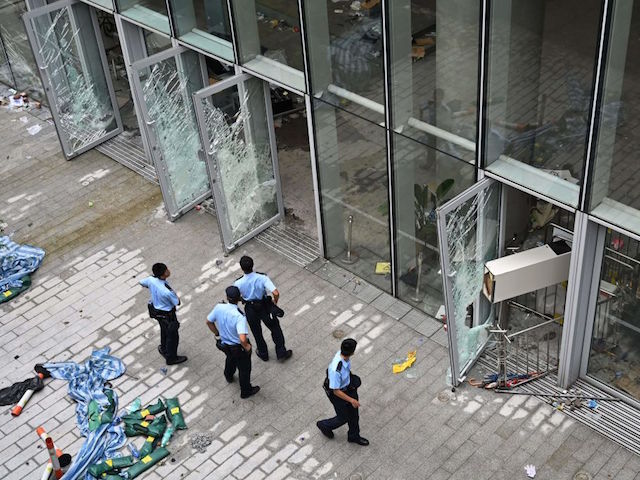
Police stand outside the Legislative Council building in Hong Kong on July 2, 2019, a day after protesters broke into the building. (HECTOR RETAMAL/AFP/Getty Images)
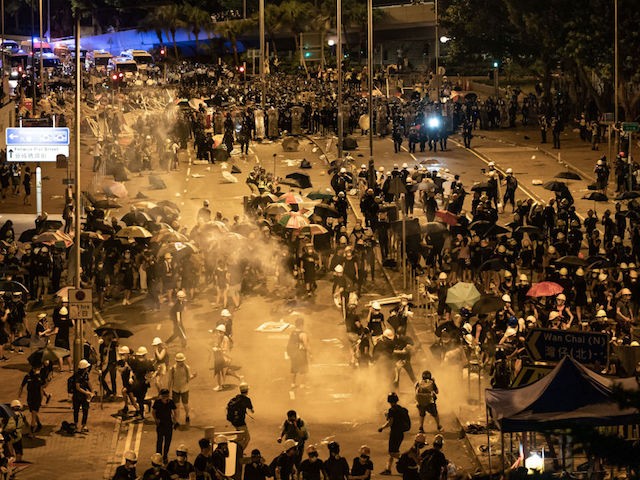
Police fire tear gas at protesters outside the Legislative Council Complex on July 2, 2019 in Hong Kong. (Anthony Kwan/Getty Images)
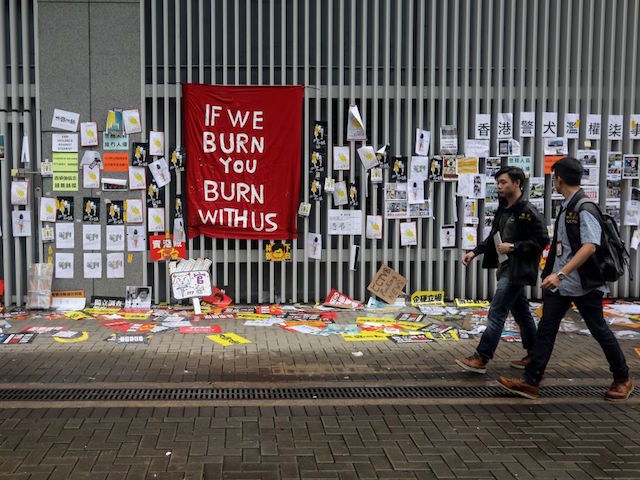
Police walk past signs and posters outside the government headquarters in Hong Kong on July 2, 2019, a day after protesters broke into the building. (VIVEK PRAKASH/AFP/Getty Images)
Reports estimate that 60 people, mostly protesters, were injured in the incident. The communist government of China is calling for “zero tolerance” for calls against Beijing controlling the southern city and chief executive Carrie Lam vowed to “pursue the lawbreaking behavior to the end.”
The destruction of the legislature occurred on the 22nd anniversary of the U.K. handing Hong Kong’s governance over to the communist Chinese regime. As part of the deal, China agreed to a policy known as “one country, two systems,” which would nominally keep China from imposing communism on the city. Under dictator Xi Jinping, China has repeatedly violated the policy, most recently endorsing a bill that would allow Beijing to extradite anyone, not just Hong Kong citizens, from Hong Kong if China charges them with a violation of communist law.
Hong Kong residents made their opposition to the extradition bill known with protests throughout June, including one that attracted 2 million of the city’s 7 million residents. In response, the legislature tabled the bill, which keeps it alive but prevents and imminent vote to turn it into law. Lam personally apologized for not properly selling the bill to her constituency, an apology many protesters considered insulting.
As Lam can revive the bill at any time, protests continued, demanding that legislators eliminate the bill completely. Protesters also demanded that Lam apologize for characterizing them as “rioters” and demanded freedom for those arrested for organizing the protests, as Hong Kongers legally have a right to free assembly. Many protesters demanded that Lam resign, though the larger movement avoided making that an official demand.
The walls of the LegCo complex were spray-painted with slogans like “we are not China,” “Carrie Lam step down,” “HK gov fucking disgrace.”
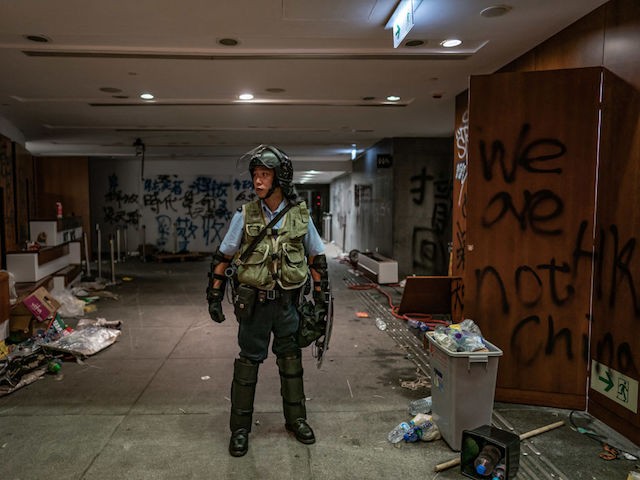
A riot police stands near graffiti inside the Legislative Council building after it was damaged by demonstrators during a protest on July 2, 2019 in Hong Kong. (Anthony Kwan/Getty Images)
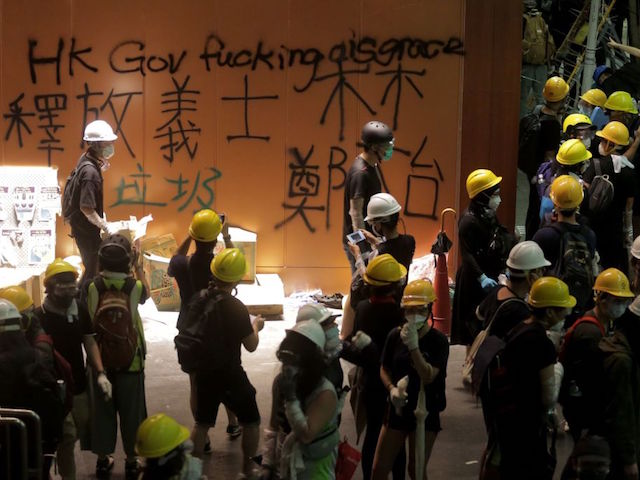
Protesters break into the government headquarters in Hong Kong on July 1, 2019, on the 22nd anniversary of the city’s handover from Britain to China. (VIVEK PRAKASH/AFP/Getty Images)
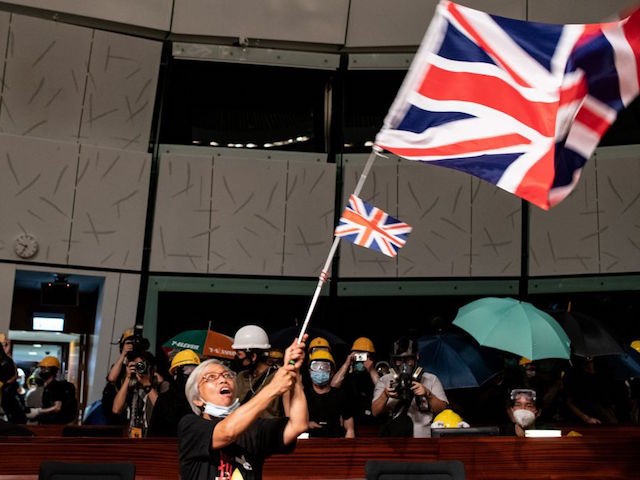
A protester waves the British Union Jack flag in the parliament chamber after they broke into the government headquarters in Hong Kong on July 1, 2019, on the 22nd anniversary of the city’s handover from Britain to China. (PHILIP FONG/AFP/Getty Images)
The protest Monday, and subsequent destruction of the legislature, was intended to make it impossible for lawmakers to convene and, thus, pass the extradition bill. The president of LegCo, Andrew Leung, said it would take at least two weeks to repair the damage.
While hundreds entered the LegCo headquarters, the protests attracted over 500,000 people. Many stayed outside, where police attacked them with tear gas. Most of the 60 injured were protesters, according to Japan’s Kyodo News. The government told media only 15 police officers were injured in the protests.
The Chinese government, both through Beijing and its arms in Hong Kong, condemned the protesters and threatened violence against them.
“Such serious illegal acts trampled on Hong Kong’s rule of law, damaged Hong Kong’s social order, harmed Hong Kong’s interests – it is a public challenge to the bottom line of ‘One Country, Two Systems,’” the Hong Kong and Macao Affairs Office of the State Council said in a statement on Tuesday, condemning the protesters as “extreme radicals.” “The central government staunchly supports the Hong Kong SAR [Special Administrative Region] government and the police to exercise their duties in accordance with the law, and supports relevant authorities of the Hong Kong SAR to seek responsibility from the violent criminals in accordance with the law.”
Lam herself held a press conference at 4 a.m. local time on Tuesday to condemn the legislative takeover. She attempted to distinguish between the daytime protests against her government and the nighttime raid on LegCo.
“We have seen two entirely different public scenes. One is a regular march on July 1. Regardless of the number of participants in the march, the march was peaceful and generally orderly. This fully reflects the inclusiveness of Hong Kong society, and the core values we attach to peace and order,” Lam said. “The second scene, which really saddens and shocks a lot of people, is the extreme use of violence and vandalism by protesters who stormed into the Legislative Council building. This is something that we should seriously condemn, because nothing is more important than the rule of law in Hong Kong.”
Lam promised her government would “pursue the lawbreaking behaviour to the end.”
Chinese foreign ministry spokesman Geng Shuang used the ministry’s regular briefing Tuesday to attack the United States and European countries that support the protesters, implying that Washington had a worse record on killing protesters than the nation responsible for the Tiananmen Square massacre.
“It is double standards for them to say they advocate the rights of peaceful protests … We all know how police in the US and Europe handle violence and enforce the law,” Geng reportedly said.
Despite the claims from the Chinese that the crowds were violent, pro-democracy movement leader Joshua Wong insisted on Twitter Tuesday that they were “NOT rioters.”
Wong also published photos of the money left at vending machines by protesters and signs protecting important historical artifacts.
Washington issued a statement Monday defending Hong Kong’s “freedoms of expression and peaceful assembly,” and President Donald Trump himself applauded the protesters.
“Well, they’re looking for democracy and I think most people want democracy. Unfortunately, some governments don’t want democracy,” Trump told reporters. “That’s what it’s all about. It’s all about democracy. There’s nothing better.”
British foreign minister Jeremy Hunt went a step further, threatening “serious consequences” for China if the communists violently crack down on the protesters or end “one country, two systems.”
“There will be serious consequences if that internationally binding legal agreement were not to be honored,” Hunt said. “The UK signed an internationally binding legal agreement … that enshrines the ‘one country, two systems rule’, enshrines the basic freedoms of the people of Hong Kong and we stand four square behind that agreement, four square behind the people of Hong Kong.”
Follow Frances Martel on Facebook and Twitter.

COMMENTS
Please let us know if you're having issues with commenting.